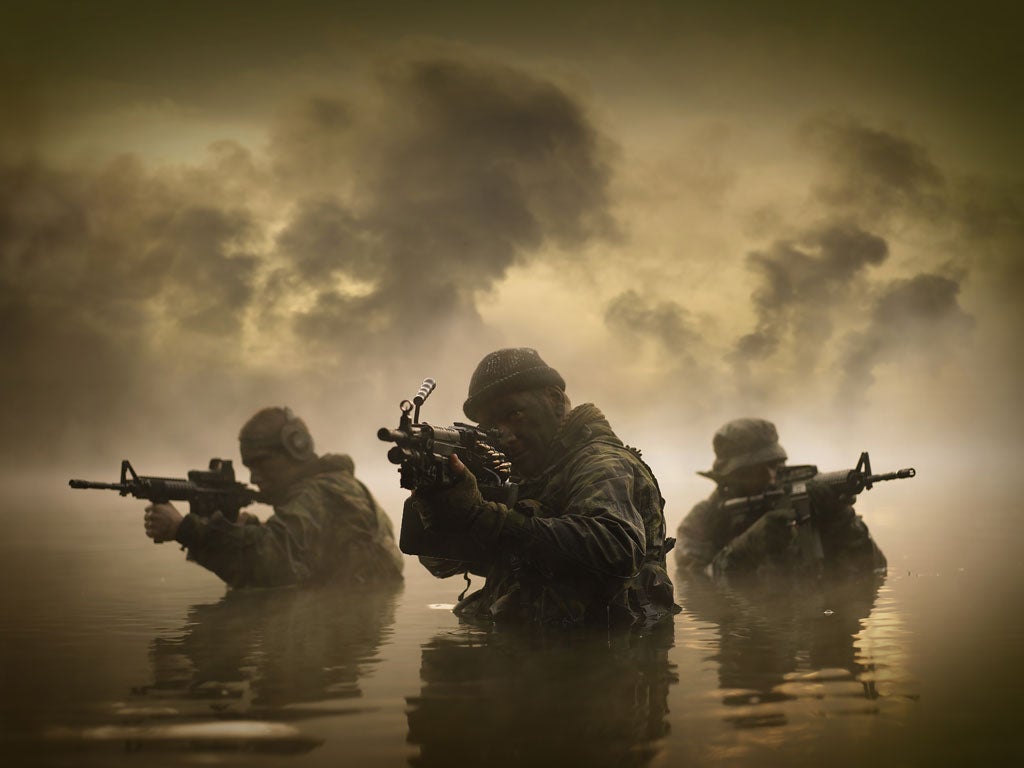Special Boat Service: A force never far from the front line of controversy
Formed during the Second World War, the naval fighters have been carrying out covert missions ever since

It was a piece of enterprising insubordination that led to the creation of the Special Boat Service. A commando officer, Roger Courtney, had learnt how quickly and silently he could cross hostile territory while paddling from Lake Victoria to the Nile on big-game hunting expeditions in the 1930s.
When war broke out in Europe he returned to the chillier climes of Scotland in defence of his country. Having failed to convince his superiors with his vision of a folding kayak brigade, he decided to demonstrate its benefits by paddling out to HMS Glengyle, which was lying at anchor in the River Clyde.
Courtney is said to have boarded the vessel undetected, written his initials on the captain's door and stolen a deck-gun cover, which he delivered to his startled superiors as they dined at a nearby hotel. He was promoted to captain and given charge of a dozen men.
The potential of Britain's amphibious special forces became apparent in 1942 when Churchill demanded the closure of the Nazi-occupied port of Bordeaux, home to the German U-Boat and merchant fleet.
Five teams of what later became known as the Cockleshell Heroes paddled their canoes up the mouth of the Gironde, though only two made it into the port. There they attached limpet mines to the moored ships – sinking one and destroying four others.
Despite the loss of life – only two escaped while six were executed and two drowned – Churchill sealed their reputation by claiming the men had hastened the end of the war by six months.
Much of the Special Boat Section's (SBS's) war-time operations took place in the eastern Mediterranean and the Adriatic although it was not always glorious. Its involvement in the ill-fated Operation Anglo, in which eight SBS officers sought to destroy German and Italian bombers on Rhodes, inspired the film They Who Dare but left the force so depleted that it was absorbed into its better-known sister unit, the SAS.
As the tide of war turned in the Allies' favour the new SBS, with its emblem of frog paddles and parachute, helped roll back the Axis powers in Italy and later Asia. After the war, the unit was active in Palestine and Korea. Among those to serve the unit in the Far East in the 1960s was a young officer called Paddy Ashdown.
SBS divers also spied on Soviet shipping and stood in for the Spetznaz, their Soviet counterparts, in training operations with the SAS. One of its most celebrated missions came in 1972, in the wake of the Black September attacks on Jewish targets at the Munich Olympics, when officers were parachuted into the Atlantic to search the QE2 after the captain was told there was a bomb aboard.
The organisation also took responsibility for protecting Britain's offshore oil rigs and nuclear power plants.
The SBS was the first unit to be dispatched to the Falkland Islands in 1982, earning it bragging rights over the SAS. It helped secure South Georgia and played a leading role in the final assault on Port Stanley. A decade later, having been placed on standby to rescue "human shield" hostages held by Saddam Hussein in Iraq, the SBS was once again the first British force on the ground. A 36-strong team dropped by helicopter into the desert outside Baghdad destroyed underground communications for the feared Scud missiles.
In 2000 the SBS also rescued a group of British soldiers kidnapped by Sierra Leone's West Side Boys. But less comfortable times lay ahead as Britain's overseas military role grew after 9/11. In Iraq its officers were accused of having "panicked and fled" in the face of enemy fire during one of the most intense engagements of the conflict.
The row overshadowed successful operations preventing the torching of the Iraqi oil wells. However the unit took the leading special forces role in Afghanistan, helping secure the Bagram air field before joining US colleagues to hunt down al-Qa'ida and Taliban leaders. Today qualified "swimmer canoeists" train at Poole in Dorset under the operational command of the director of special forces. Four squadrons are deployed throughout the British military.
Secret weapon: History of the SBS
1940 Founded in Scotland under the name Folboat Troop
1942 Kayak mission on the harbour at Bordeaux earns the unit the title 'Cockleshell Heroes'
1943 Carries out reconnaissance for Salerno landings in Italy
1950 Operates behind enemy lines in North Korea during Korean War
1972 Parachutes into the Atlantic to find a bomb feared to be aboard the QE2
1982 Helps liberate South Georgia during Falklands conflict
1991 Destroys control systems for Iraqi Scud missiles during Gulf War
2000 Rescues British troops held captive in Sierra Leone
2001 Secures Bagram airfield in Afghanistan. Takes part in battle of Tora Bora
2008 Ambushes Taliban leader Mullah Abdul Matin
2012 Ill-fated bid to rescue British and Italian hostages in Nigeria
Subscribe to Independent Premium to bookmark this article
Want to bookmark your favourite articles and stories to read or reference later? Start your Independent Premium subscription today.

Join our commenting forum
Join thought-provoking conversations, follow other Independent readers and see their replies